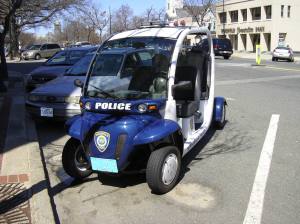Green gurus
There is a group in Wakefield that wants very much to tell you how to live your life. And if you run a business, they’ve got plenty of ideas they’d like to “share” with you on that as well.
No, I’m not talking about the Opera Club of Wakefield.
I speak, of course, of the Environmental Sustainability Committee and its innumerable subcommittees. These subcommittees include the Community Engagement & Outreach Subcommittee, the Waste Reduction Subcomittee, the Green Business Subcommittee, the Climate Action Subcommittee and the Green Space Subcommittee. And last, but certainly not least, Community Education Subcommittee.
One of the ESC’s “Guiding Principles” is “Reduce, reuse, recycle and compost.” They could start by reducing their number of subcommittees.
At the suggestion of a local citizen who will go unnamed (and unforgiven), I watched the videos of two recent ESC subcommittee meetings. That’s 2 hours and 23 minutes of my life that I’ll never get back, but it was instructive in a morbid kind of way.
These subcommittees have a decidedly distaff feel, and more than anything, the ladies see their role as that of educators. There was much talk about their need to “educate” residents and business owners, who, if left to their own devices, might toss a compostable cup into a recycling bin (a big no-no).
 The Green Business Subcommittee spent considerable time discussing the need to “educate” restaurant owners about the evils of individual ketchup packets.
The Green Business Subcommittee spent considerable time discussing the need to “educate” restaurant owners about the evils of individual ketchup packets.
But their main focus these days appears to be on an initiative called the “Wakefield Green Business Program” aimed at guiding local businesses toward “making sustainability-minded changes, including support of electrification of fleets and waste reduction.”
As part of their “education,” each participating business would be assigned an ESC member as a “coach” to answer questions and help them find resources (putting those nurturing qualities to good use).
There would also be regular “gatherings” and “info sessions” at a downtown restaurant for participating businesses to share ideas and experiences. Subcommittee members debated whether it would be better to hold these info sessions in the evening or during the day when owners could just “pop over.” Because merchants have all kinds of time to “pop over” to Brothers during business hours to be lectured about better ways to compost.
 Like the “Green Business Subcommittee,” the ESC’s Climate Action Subcommittee is also big on “educating” residents and the business community. Among other things, they want to “educate community businesses about the benefits of buying and driving electric vehicles.” They also want to educate developers about the importance of providing EV chargers for their buildings.
Like the “Green Business Subcommittee,” the ESC’s Climate Action Subcommittee is also big on “educating” residents and the business community. Among other things, they want to “educate community businesses about the benefits of buying and driving electric vehicles.” They also want to educate developers about the importance of providing EV chargers for their buildings.
Educating the public is very important because, according to one subcommittee member, many people, including “very well-educated people,” don’t know that natural gas is a fossil fuel! Her fellow subcommittee members were duly horrified to hear of this rampant ignorance.
Environmental Sustainability Committee members believe in starting with voluntary “pilot programs,” after which they become mandatory. That would apply to another ESC subcommittee brainstorm: licensing rental units for energy efficiency standards. First you get a few landlords to “voluntarily” meet insane energy efficiency standards in their buildings, and “then ramp it up.” As one subcommittee member admitted in a moment of transparency, “I don’t think anyone would volunteer for this. This would be a change in permitting.” In other words, it would be mandatory.
If you doubt Environmental Sustainability Committee’s ability to impact your life, consider the “Climate Leader Communities” program that Wakefield recently joined at the behest of the ESC. This program requires Wakefield to, among other things, commit to eliminating fossil fuel use in municipal buildings and operations by 2050, create a municipal “decarbonization roadmap” and adopt a zero-emission vehicle policy. 
Nobody disputes the fact that this will cost taxpayers millions of additional dollars in the coming years for things like electric fire engines, police cruisers, dump trucks, snowplows and other things that cost twice as much and don’t work as well as fossil-fuel powered models.
But that’s of no concern to the Environmental Sustainability Committee. One of their “Guiding Principles” listed on their web site is to “Think beyond first costs and consider long-term, cumulative impacts when making policy and financial decisions.” Another is to “balance environmental quality, economic prosperity, community livability and social equity.”
They’re saving the planet, after all. You can’t put a price tag on that.
—
[This column originally appeared in the June 13, 2024 Wakefield Daily Item.]
Filed under: Columns & Essays, Humor, News, Opinion, Politics, Wakefield | 1 Comment
Tags: business, Climate Change, Climate Leader Communities, commercial, compost, developers, education, electric vehicles, Environmental Sustainability Committee, ESC, EV chargers, EVs, fossil fuels, Gobal Warming, green, Humor, kechup, landlords, Mark Sardella, natural gas, Opera Club of Wakefield, Opinion, planet, recycling, residential, social equity, sustainable, taxpayers, Wakefield Daily Item, Wakefield MA, waste reduction










More heat than light in this one. Why don’t you swap that around next time?